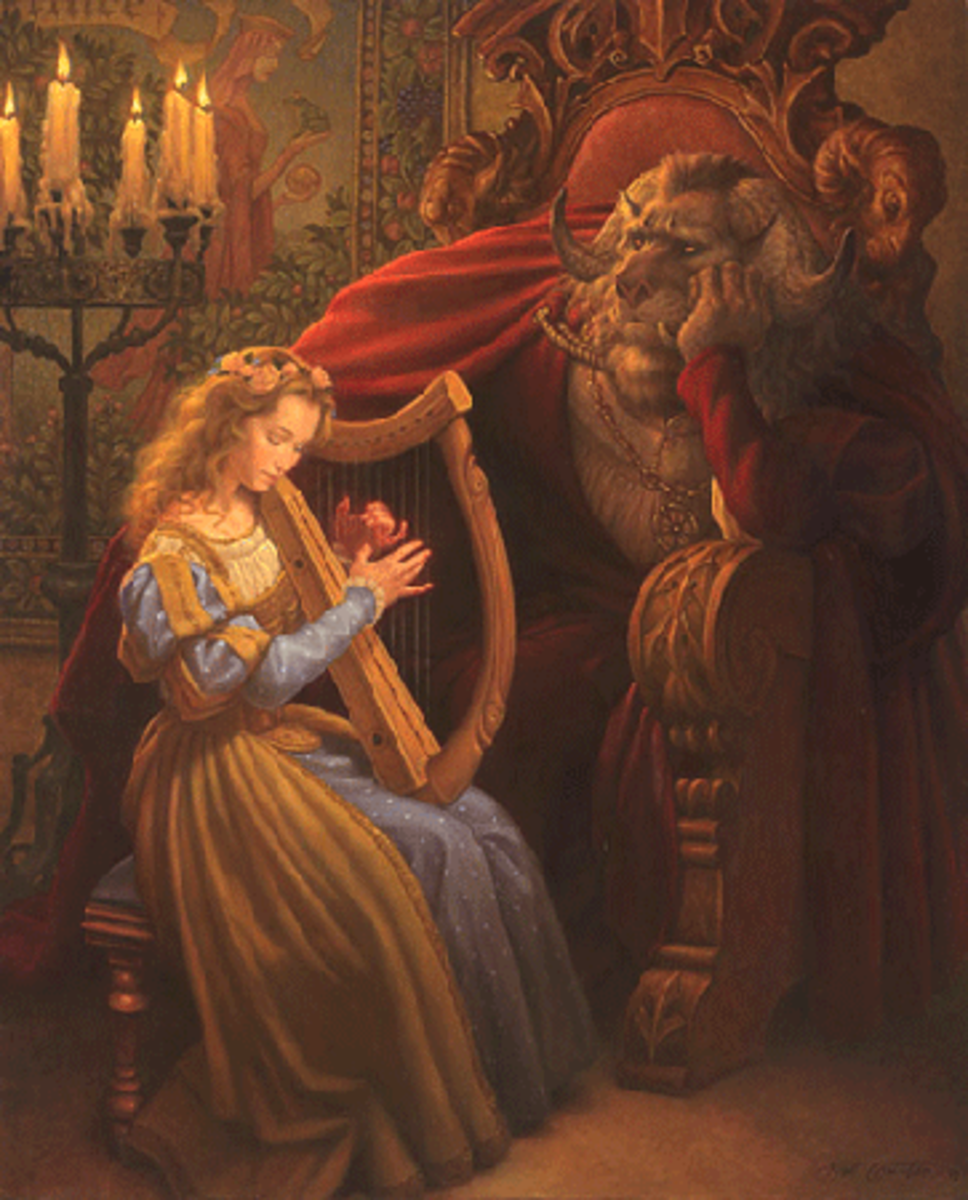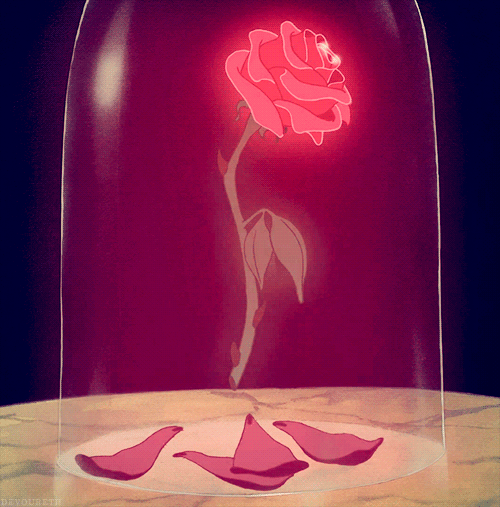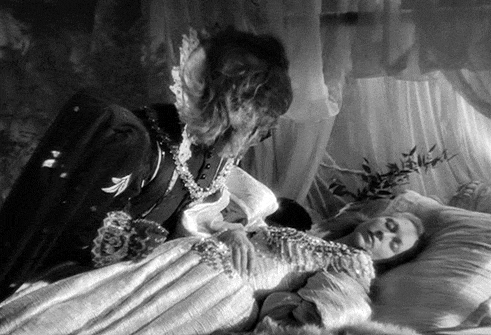Variations on the same theme: Beauty and the Beast (1946, 1991 and beyond)
Tale as old as time
True as it can be
Barely even friendship
Then somebody bends
Unexpectedly
Just a little change
Small to say the least
Both a little scared
Neither one prepared
Beauty
and the Beast!
A
belíssima história de amor entre uma mulher e uma criatura que parece um búfalo
é um conto de fadas que existe há um bom tempo: foi publicada em 1740, escrita
por Gabrielle-Suzanne Barbot de Villeneuve. Após a morte de Gabrielle, outra
escritora francesa, Jeanne-Marie Leprince de Beaumont, reescreveu o conto de
fadas. Mas a história na verdade tem mais de 4000 anos!
The wonderful love story between a woman and a
bull-like creature is a fairy tale that has been around for quite a while: it
was published in 1740, written by Gabrielle-Suzanne Barbot de Villeneuve. After
Gabrielle died, another French writer, Jeanne-Marie Leprince de Beaumont,
rewrote the fairy tale. But the story actually
originated more then 4000 years ago!
Originalmente,
a Bela e a Fera era bem semelhante a outros contos de fada, pelo menos em
relação à história. Bela era a filha mais nova de um comerciante viúvo. Ela
tinha duas irmãs muito preocupadas com a aparência e três irmãos que viviam se
metendo em confusões. Quando seu pai recebe a notícia de que um de seus navios
perdidos foi encontrado, a família toda, que estava há alguns meses vivendo na
pobreza, fica em polvorosa. As irmãs querem que o pai lhes traga vestidos
chiques com o dinheiro da venda dos produtos do navio. Bela quer apenas uma rosa.
In its genesis, Beauty and the Beast was very similar
to other fairy tales, at least in its history. Belle was the youngest daughter
of a widow sea merchant. She had two vain sisters and three troublemaker
brothers. When her father recovers one of his ships after living some months in
poverty, the whole family gets excited. The sisters want the father to bring
fancy dresses to them, but Belle wants only a rose.
Voltando
da negociação malsucedida no porto, o pai de Bela entra no território da Fera e
é pego. A Fera deixa o pai da Bela visitar a família uma última vez, mas ele
não volta ao cativeiro: a Bela toma o lugar do pai e parte para o castelo da
Fera. A versão francesa de 1946 segue este roteiro. Nela, Bela é interpretada
por Josette Day e a Fera por Jean Marais.
Coming back from an ill-fated negotiation at the
harbor, Belle's father enters the Beast's territory and is imprisoned. The
Beast lets Belle's father see his family for the last time, but he doesn't come
back: Belle goes to the Beast's castle in her father's place. The 1946 French
movie follows this storyline. Belle is pyayed by gorgeous Josette Day, and the
Beast by Jean Marais.
A versão
de 1946 pode surpreender quem não está acostumado a ver clássicos e pensa que
todos os filmes antigos são primitivos e chatos. Na verdade, a versão francesa
é simplesmente mágica, e faz a mágica sem efeitos especiais computadorizados.
Ainda por cima, é um filme feito logo após a Segunda Guerra Mundial, conflito
do qual a França saiu muito abalada. De certa maneira, este é o tipo de filme
que a França precisava na época: um filme que nos faz acreditar em mágica
novamente.
The 1946 version may surprise the ones who are not
used to old movies and expect it to be dull and primitive. Actually, the French
version is nothing but magical, and does it without CGI and when France had
just left World War II with lots of scars. In a sense, it was the kind of
comfort movie France needed then: a movie that makes you believe in magic
again.
Meu
truque favorito no filme de Jean Cocteau são os braços humanos que seguram
objetos como velas e espelhos dentro do castelo da Fera. Foi asism que ele
conseguiu mostrar os serviçais amaldiçoados no castelo. E isso não é tudo: a
iluminação também confere um toque mágico. À luz de velas, Josette Day é
etérea, angelical. Esse efeito não poderia ser obtido apenas com a luz em um
filme a cores.
My favorite trick in Jean Cocteau's film is his idea
of having moving arms holding the objects like candles and mirrors inside the
Beast's castle. It was through this trick that he could transport to the screen
the cursed maids, butlers and cooks. And this is not all: the lightning also
adds to the magic. By candlelight, Josette Day looks ethereal, and such an
effect couldn't be achieved in a color film.
Não, o
pai da Bela não era um inventor. Ela não era filha única, nem uma leitora voraz
(ou seja, ela não era como eu). Ela não era paquerada pelo insistente e vaidoso
Gaston, o homem com grandes músculos e cérebro de ervilha. Tudo isso é o toque
Disney. Mas estas mudanças na história, junto com a animação de qualidade,
obviamente, fizeram o filme ser indicado ao Oscar de Melhor Filme em 1992. É
interessante notar que a animação tem diversas conexões com o cinema clássico.
No, Belle's father wasn't an inventor. She wasn't a
single child who was also a bookworm (she wasn't me, after all). She wasn't
courted by Gaston, a man with great muscles and a pea-sized brain. All this is
Disney exclusivity. But those changes in the story, along with the great
animation, of course, made the animated feature be nominated for the Best
Picture Oscar in 1992. Interestingly, the animation has many connections to classic films.
A
versão de 1946 inspirou o estilo de um episódio de 'Teatro dos Contos de Fada". Neste episódio, dirigido
por Roger Vadim, a Bela é interpretada por Susan Sarandon e a Fera por Klaus
Kinski. Será que já houve escalação de elenco melhor do que esta?
The 1946 version inspired the look of an episode of
“Shelley Duvall's Faerie Tale Theatre”. In this episode, directed by Roger
Vadim, Belle is played by Susan Sarandon, and the Beast by Klaus Kinski. Has
there ever been a better casting than this?
Houve
uma versão em 2014, novamente feita na França, com Léa Seydoux e Vincent Cassel
nos papéis principais. O filme pode ser visualmente deslumbrante, mas falta
algo – talvez tenha sido a narrativa confusa, que avança e retrocede no tempo
sem aviso, ou talvez seja a falta de química do casal. De toda forma, o filme é
uma festa para os olhos e ao mesmo tempo uma cura para a insônia. Bem, pelo
menos nesta versão a Bela e a Fera têm roupas lindas e diferentes do usual para
o grande baile:
There was a 2014 version, again made in France, with
Léa Seydoux and Vincent Cassel in the lead roles. While it is visually
breathtaking, the film lacks something – maybe it is the confused narrative, that
goes back and forward in time without warning, or maybe it is the lack of
chemistry between the couple. Anyway, it is a feast for the eyes but at the
same time a cure for insomnia. Well, at least in this version Belle and the
Beast have different and gorgeous clothes for their dance:
A primeira adaptação para o cinema foi feita pela
Pathé-Freres em 1899. Outras versões se seguiram, ainda no cinema mudo, tanto
na França quanto na Inglaterra, mas há pouquíssimas informações sobre elas. O
que se sabe é que existe uma cópia – ou possivelmente um fragmento – da versão
de 1913 na Cinemateca Francesa. É uma pensa que não foi feita nenhuma versão da
história na Hollywood do cinema mudo!
The first film adaptation of the story to the cinema
was made by Pathé-Freres in 1899. Many more versions were made in the silent
era, both in France and the UK, but information about these movies is scarce. A
copy – or rather a fragment – of the 1913 version certainly exists in the
French Cinémathèque, though. It’s a pity that no version of the tale was
adapted to the screen in silent-era Hollywood!
Na TV foram feitas também diversas adaptações,
entre filmes e episódios, entre os quais está um de “Shirley Temple’s Storybook”
de 1958. Séries de TV também se inspiraram na história, incluindo uma versão modernizada
estrelada por Linda Hamilton e Ron Perlman que durou três temporadas, de 1987 a
1990.
On TV there were several versions as well, considering
TV movies and episodes such as one from “Shirley Temple’s Storybook” in 1958.
TV series were also inspired by the tale, including a modernized version with
Linda Hamilton and Ron Perlman, that lasted three seasons, from 1987 to 1990.
Qualquer que seja a versão e sua opinião sobre a
história – afinal, qual a moral do conto de fadas (as aparências não importam
ou o amor cura tudo?) – o cinema sempre conseguiu levar para as telas a magia
que nos faz continuar acreditando no conto de fadas.
Whatever the version, and whatever is your reading of
the story – which could exactly be the lesson we learned with Beauty and the
Beast (appearances don’t matter / love cures everything?) – the film world
never failed to translate the magic that makes us believe in fairy tales.








2 comments:
I still miss the TV B&B. Is it wrong for me to continue to hold a grudge against Linda Hamilton for leaving the show to make TERMINATOR 2?
A Bela e o Monstro (2017): 5*
As músicas, o elenco e a magia presente cativaram-me e adorei a sua fidelidade ao enredo original.
Já viu?
Cumprimentos, Frederico Daniel.
Post a Comment